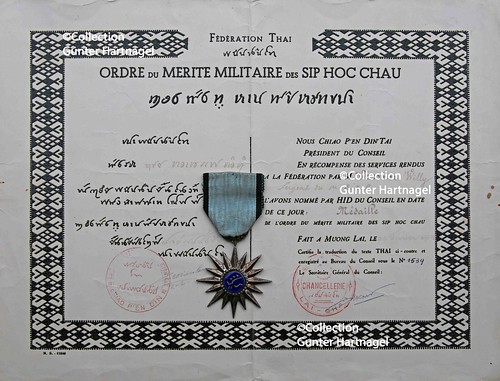

The German sergent belonged to the 1er B.E.P. (1st Foreign Parachute Battalion) of the French Foreign Legion. He took part in the battle of Dien Bien Phu and somehow survived it.
The order is the Tai Federation Order of Military Merit
"Ordre du Mérite Militaire des Sip Hoc Chau".
Inscribed in Tai script "Muong-Ta" for Tai Federation (very close to Thai language Muang).
The Tai minority people in northwestern Vietnam and northern Laos – part of the broad family of Thai peoples of southeast Asia and southern China – had long had an independence. Their loose federation, the Sip Song Chau Tai, comprised some twelve cantons (muangs) in the area of Lai Chau, Son La, and Dien Bien Phu.
After World War II the French began to encourage Tai separatism as a defense against the ambitions of both the Vietnamese communists and nationalists. On March 1, 1948, to the anger of Vietnamese nationalists, the Tai Federation was given autonomous status within the French Union with its own flag and capital at Lai Chau. Pressed by both the French and the Viet Minh, Tai and other minorities fought on both sides, but, with the allegiance of the Tai leader Deo Van Long, the French did receive considerable support from the highland people of the north.
The Tai country became the site of major battles of the First Indochina War. In September 1951 the 312th Viet Minh Division assaulted Nghia Lo, the eastern key to the highlands, but were beaten off. In October 1952 these Viet Minh divisions undertook a major offensive which was marked by the sacrifice of the 6th Colonial Parachute Battalion. The climactic battle of Dien Bien Phu took place in 1953 after the French army dropped in parachute battalions to recapture the small highland center and to establish a "blocking position" — which instead became a trap for both the defending force and French policy in Indochina.
The Tai supplied a number of mountain battalions to the French Union forces and the many partisans who were commanded by French officers and NCOs in the Composite Airborne Commando Group (C.G.M.A.). The effectiveness of these guerilla forces was long argued among French military observers. The communists’ own writings indicate, however, that they considered the partisans a thorn in their side. It was not until well after the Viet Minh victory that the Tai partisans were destroyed completely.
After their victory the communists established "autonomous zones" in the highland areas for the minorities, being careful as always to retain real control with central authority.
Source: Indochina Medals – Tai Federation and Nung Autonomous Zone – Index
Posted by blauepics on 2021-03-11 16:55:13
Tagged: , Vietnam , Lai , Chau , Châu , province , Provinz , 1954 , French , Foreign , Legion , Fremdenlegion , war , französische , Krieg , history , Geschichte , defence , system , Verteidigungsanlage , Fortification , soldiers , Soldaten , Tai , Sip , Hoc , Song , muang , autonomous , cantons , 1er , 1. , B.E.P. , partisans , Partisanen , independence , Unabhängigkeit , parachute , battalions , Fallschirmjäger , Bataillone , Dien , Bien , Phu , battle , Schlacht , German , deutscher , order , Medal , Federation , Military , Merit , Ordre , du , Mérite , Militaire , des , legionnaire , Legionär






